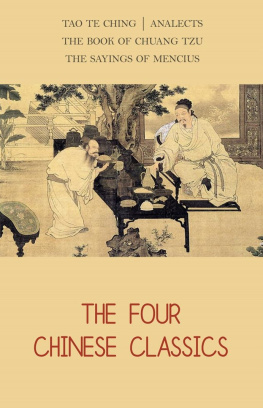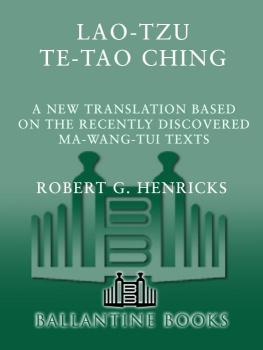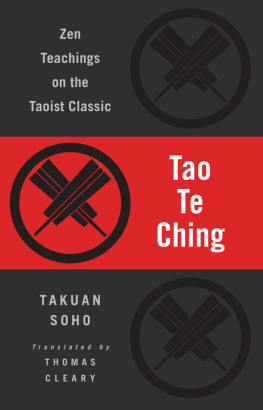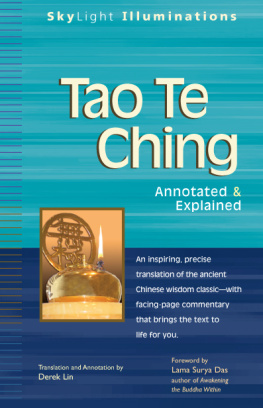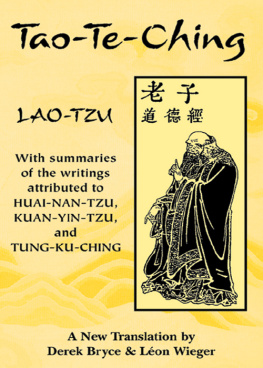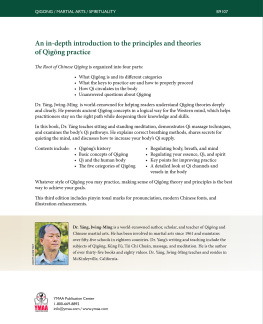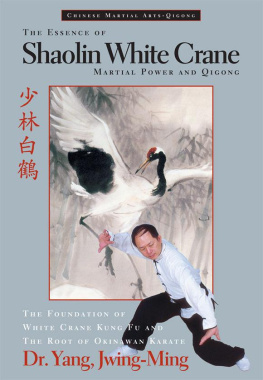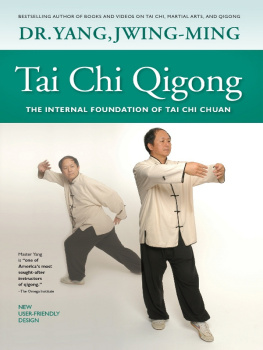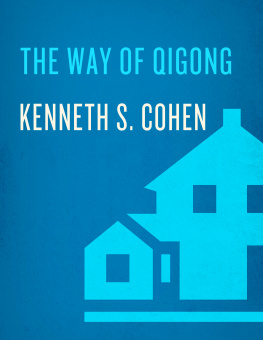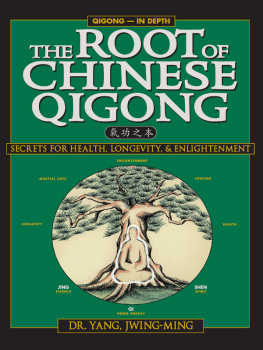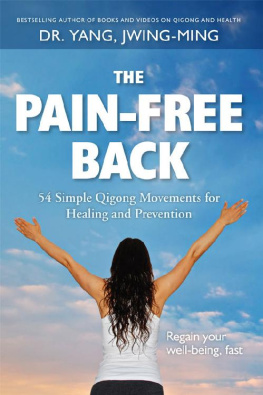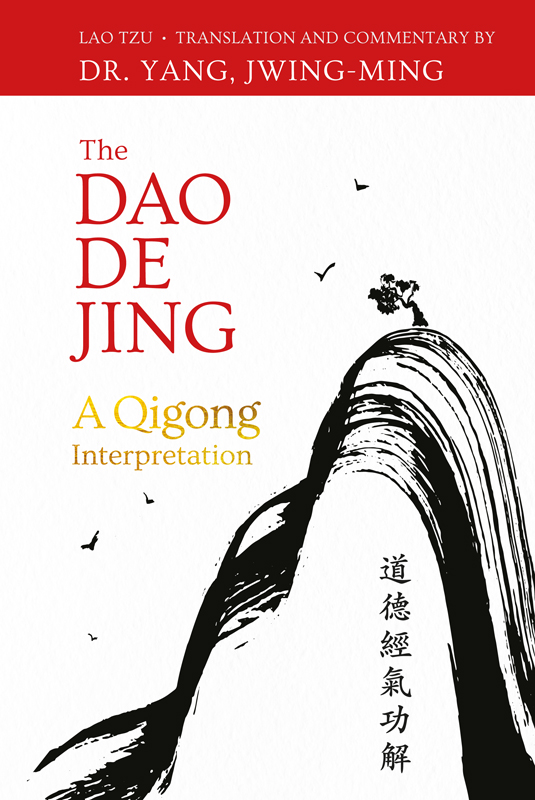Contents
Guide
Pagebreaks of the print version
The Dao De Jing
A Qigong Interpretation
Lao Tzu
Translation and Commentary by
Dr. Yang, Jwing-Ming
YMAA Publication Center
Wolfeboro, NH USA
YMAA Publication Center, Inc.
PO Box 480
Wolfeboro, New Hampshire, 03894
1-800-669-8892
ISBN: 9781594396199 (print) ISBN: 9781594396205 (ebook)
Copyright 2018 by Dr. Yang, Jwing-Ming
All rights reserved including the right of reproduction in whole or in part in any form.
Managing Editor: T. G. LaFredo
Copy Editors: Dorin Hunter and Leslie Takao
Cover design by Axie Breen
This book typeset in Electra LT
Illustrations courtesy of the the author unless otherwise noted.
This ebook contains Chinese translations of many terms and may not display properly on all e-reader devices. You may need to adjust your Publisher Font Default setting.
Publishers Cataloging in Publication
Names: Laozi, author. | Yang, Jwing-Ming, 1946- translator, author of added commentary.
Title: The dao de jing : a qigong interpretation / Lao Tzu ; translation and commentary by Dr. Yang, Jwing-Ming.
Description: Wolfeboro, NH USA : YMAA Publication Center, [2018] | Includes bibliographical references.
Identifiers: ISBN: 9781594396199 | 9781594396205 (ebook) | LCCN: 2018945774
Subjects: LCSH: Laozi. Dao de jing. | Laozi--Criticism and interpretation. | Taoism. | Taoist philosophy. | Philosophy, Chinese. | Qi gong. | Mind and body. | Meditation. | Well-being. | Qi (Chinese philosphy) | Medicine, Chinese. | BISAC: PHILOSOPHY / Taoist. | BODY, MIND & SPIRIT / I Ching. | HEALTH & FITNESS / Alternative Therapies.
Classification: LCC: BL1900.L3 E5 2018 | DDC: 299.5/1482--dc23
NOTE TO READERS
The practice, treatments, and methods described in this book should not be used as an alternative to professional medical diagnosis or treatment. The author and publisher of this book are NOT RESPONSIBLE in any manner whatsoever for any injury or negative effects that may occur through following the instructions and advice contained herein.
It is recommended that before beginning any treatment or exercise program, you consult your medical professional to determine whether you should undertake this course of practice.
The use ofthese bracketsin Chinese text denotes a book title.
Table of Contents
Thomas G. Gutheil, MD
When the mind is steady, then you can acquire calmness. When you are calm, then you find peace. When you are at peace, then you are able to ponder. When you are able to ponder, then you gain. All objects have their initiation and termination, and all matters have a beginning and expiration. If one knows the beginning and the end, then one is closer to the Dao.
Li Ji
I am deeply honored by the invitation to write this preface to Dr. Yangs meticulously crafted book; yet I am also humbled by the task of trying to introduce a work of such depth and complexity. Some time ago, in the twenty years or so during which I had the exhilarating experience of studying Shaolin Gongfu under his tutelage, I gradually discovered his interests in Eastern scholarship beyond the practical martial arts. One of the fruits of that scholarship is before you now. Be sure, however, that the connections and associations I derive are entirely my own, as are any errors or misunderstandings.
Dr. Yang appropriately begins with, and repeatedly addresses, the obstacles that both Eastern and Western readers encounter in grappling with the concepts in this book. He outlines the various levels of obstacles. First, in attempting to deal with ancient texts there are challenges of meaning, especially given the inherent redundancy of much of the Chinese language, where the same character or word may have different meanings based on context and tone. Second, there is the Chinese cultural worldview, which must affect this discussion. Third is the use of metaphor and analogywhat Western readers perceive as a colorful language not usually used to discuss serious principles, where anatomic/physical and symbolic usages coexist comfortably. For example, water is used as an image of desirable humility: water humbly reaches the lowest level (we say water seeks its own level) without complaint. Indeed, this preface is intended as a first step in surmounting those same obstacles by attempting to place these traditional ideas in a modern context accessible to todays readers.
Finally, there is the use of paradoxes; for example, wuwei can be translated as the doing of not doing. Somewhat similar to the koan in Buddhist thought, the paradox forces the readers mind into a new channel. In this connection, martial arts students may recall Bruce Lees description of his art in Enter the Dragon as fighting without fighting. Paradoxically as well, the purpose of study, concentration, and effort is to achieve emptiness that can be filled by new ideas and to recover the innocence of childhood. Elsewhere in this text, reference is made to a semisleeping state, itself a parallel to Buddhist themes such as zazen meditation.
Understanding the Dao is certainly made challenging in itself, since it is described as without shape and colorindeed, without explicit or concrete description. It thus resemblesin its formlessness and ubiquitous permeation of all thingsGod, Nature, and even the Force used by the Jedi in the Star Wars universe. Lest readers feel this is far-fetched, Dr. Yang observes later in this book: Dao is always in a state of high alertness so it can sense any disorder in this universe and respond to the changes. Note how this closely parallels the notion of a disturbance in the Force. The Dethe manifest universeis described as an expression of the Dao.
One of the ways in which Dr. Yang takes on the challenges noted above is by frequently quoting other authors and scholars as they comment on the same material; this is helpful to the student, since reading any one description of a subject may confuse a reader, but other phrasings, other images, may clarify the point.
Dr. Yang ranges freely among such relatively familiar concepts as qi, body meridians, the Yi Jing, yin and yang, and the third eye. More expansively, he relates those basics to such widely separated fields as scientific research into the tiny particles composing matter and the theory of the subconscious, most elaborately introduced in Europe by Dr. Sigmund Freud. In fact, Dr. Yang calls on his audience to develop a scientific approach to spirit, and professes no conflict between these two ideas.
One important concept about the Dao, among many, is the generalization from the persons self (a small universe) and the persons body, to the family, then to the natural world at large and to governments; this potential application is captured by the familiar expression, the body politic. Running through the discussion is the notion of achieving a calm and peaceful mind by using the wisdom mind to govern the emotional mindto achieve, among other goals, a union of body and spirit and a deep connection to the natural world. The wuji state, described as neutral mind without thoughts, echoes modern conceptions of meditation and mindfulness: a personal peace should lead eventually to a society at peace.
How does the health practice called qigong apply to these ideas? In , Dr. Yang summarizes with a military metaphor:
Qigong practice can be compared to a battle against sickness and aging. If you compare your body to a battlefield, then your mind is like the general who generates ideas and controls the situation, and your breathing is his strategy. Your qi is like the soldiers who are led to various places on the battlefield. Your essence is like the quality of the soldiers, such as educational background and the skills of combat, etc. Finally, your spirit is the morale of the army.


